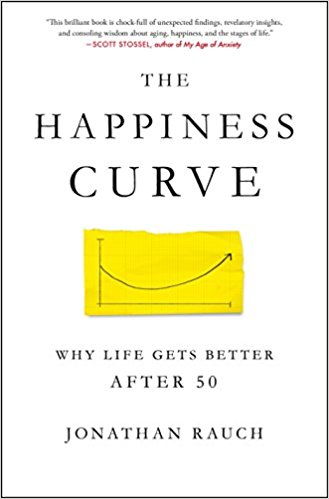You have /5 articles left.
Sign up for a free account or log in.
 The Happiness Curve: Why Life Gets Better After 50 by Jonathan Rauch
The Happiness Curve: Why Life Gets Better After 50 by Jonathan Rauch
Published in May of 2018.
For the past couple of weeks I’ve been telling everyone I know about The Happiness Curve. A typical conversation goes like this:
Me: I’m reading this amazing book, The Happiness Curve. It explains so much about why so many of us in our 40s are experiencing a sense of malaise. I wish I had known about the research behind The Happiness Curve long ago, as it would have prepared me for the last few years.
Everyone Else: What are you talking about? Everyone knows about the dip in happiness in one’s forties. This is not new news. Jonathan Rauch even wrote an article in The Atlantic a few years ago on this research. I’m surprised that someone like you who can’t stop talking about all the books you “read” [note, here my friends and colleagues and family members always use air quotes when they “read” in order to indicate audiobooks] didn’t know about this happiness thing.
Okay. Did you know about the mid-40s malaise, and the work of Jonathan Rauch in popularizing this research?
Am I the last one to find out that most people in their 40s experience a slow-motion crisis of diminished future expectations, paired with a growing realization of one’s own blind spots and limitations?
The Happiness Curve should be given to everyone on their 40th birthday. Required reading.
As Rauch explains, knowing that this midlife disquiet is coming will not alleviate its symptoms. Unfortunately, it is not possible to read a book on this life stage and then avoid its pitfalls. Knowledge is helpful, but it is neither preventive or curative.
What awareness of the happiness curve can give us is some measure of self-forgiveness. We will still feel bad. But we don’t need to feel bad about feeling bad. And as Rauch assures us, just when we think we will never get out of the trough of midlife despair, we do.
Might the happiness curve help explain why so many in academia are so miserable? Campuses are full of faculty and staff in midlife.
A takeaway from The Happiness Curve is that we should be recruiting as many people over 50, and preferably over 60 or even 70, as possible to our institutions. Not only will they bring their accumulated years of knowledge and experience and wisdom, they are also likely to be in a good mood.
Why the midlife slump? Rauch thinks that the answers may be more biological than cultural. It seems as if every culture experiences a similar down time. Even chimps don’t get a midlife pass.
One theory is that the brains of people in their 40s are re-organizing themselves in order to take on the challenges of later life. The second half of one’s time on earth is less about individual achievement, and more about contributing to the future well-being of our communities.
One of the reasons that The Happiness Curve is such an effective and persuasive book is that Rauch relates the research to his own narrative. He brings himself into the story of midlife challenge in ways that are both illuminating and courageous. The fact that Rauch is such an accomplished reporter and writer certainly aids to this approach to nonfiction storytelling.
Where are you on the happiness curve?
Has your own experience of life after 50 really been as good as Rauch describes?
What books have you read that have changed, or at least enlightened, your perspective on your own journey through life?
What are you reading?




